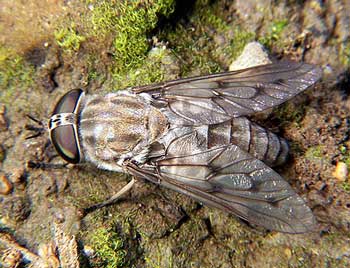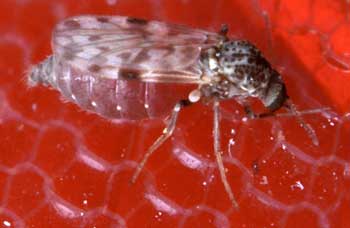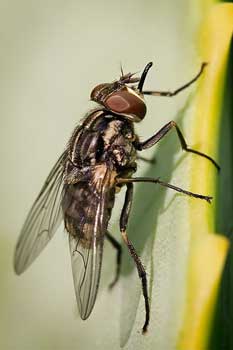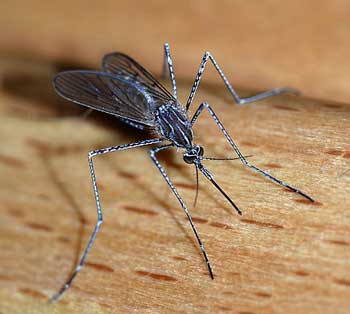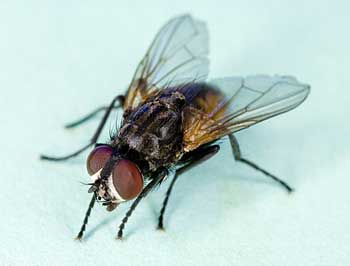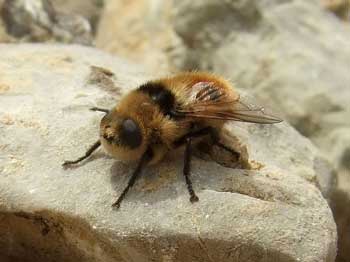Flies and Mosquitoes – Your Help Your Horse Guide
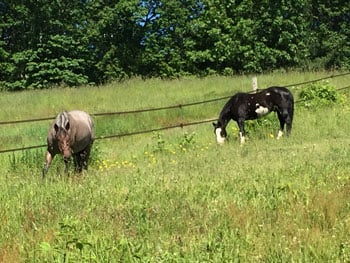 Helping your horse deal with biting insects is a constant battle during the warmer months. But when you add in the element of a horse trailer, it becomes even more important to keep your horses well protected.
Helping your horse deal with biting insects is a constant battle during the warmer months. But when you add in the element of a horse trailer, it becomes even more important to keep your horses well protected.
Brad Heath, owner of Double D Trailers, recounted one story of a horse that was severely bitten by a nasty bug while traveling.
“I had a client in Florida a few years ago hauling with a SafeTack 2 horse gooseneck… she was hauling a horse that had been traveling with her for over 10 years. Out of nowhere while in tow, she saw her horse's hoof sticking through the drop down window opening. More than likely, the horse was bitten to the point he started freaking out.”
Summertime is when flies and mosquitos breed and mature the most. Staying one step ahead of these rapidly multiplying bugs can be a real trick, but pest control is vital to your horse’s health and happiness.
Five Tips to Protect Your Horse from Insects
1. Keep That Manure Under Control
One of the best ways to keep pests from ruining your day involves just a pitchfork and some elbow grease. Managing the manure around your stable, within your campsite, or inside your trailer can keep biting flies away.
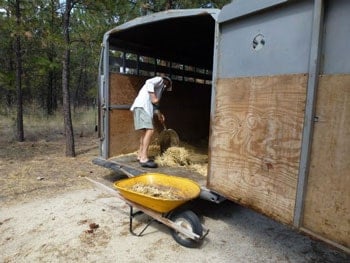 Insects are naturally drawn to manure, so keeping your horse’s hang out area free from piles of manure will help prevent the spread of external and internal parasites.
Insects are naturally drawn to manure, so keeping your horse’s hang out area free from piles of manure will help prevent the spread of external and internal parasites.
2. Clean Water Each Day Keeps Mosquitos Away!
A puddle of stagnant water is like pure paradise for mosquitos. These nasty biting insects are the main transmitter of horse diseases like West Nile Virus and Eastern equine encephalitis (EEE).
One way to keep mosquitos under control is to refresh your horses’ water buckets and water troughs regularly. When you drive your horse trailer to a new location, park away from stagnant ponds or marshy areas whenever possible.
If you have a natural pond or large water trough on your farm, consider introducing some fish to live within. Fish will consume some of the algae that builds up and also eat any mosquito larvae that manage to take hold.
3. Protective Gear for Your Horse
For us humans, the best armor we can use against biting flies is a light layer of clothing. Well, the same thing goes for your horse!
Consider placing a light fly sheet or fly mask on your horse while on your farm, in the trailer, or in a new location. Besides protecting from annoying flies, fly masks are also a great safety tool to help protect your horses’ eyes from roadway debris if you are traveling with an open sided stock trailer.
A word of caution here… be sure to check under your horses’ fly sheet regularly to make sure they do not have any cuts or scrapes that need attention. Any open skin wounds should be treated with something like SWAT repellent to keep insects from agitating the wound.
4.  Fly Repellents
Fly Repellents
Good old fly spray is sometimes your best defense against biting flies when you trailer or ride your horse. There are several insecticidal products made to help control pest flies on horses, many containing pyrethroids. Be sure to spray his entire body according to the product’s directions — including legs, belly, and neck. Use your hand to gently rub spray onto your horse’s face, ears and around (but not in) the eyes.
Special roll-on fly repellent products are also available to protect your horse’s delicate ears — which are a great places for insects to find refuge. Make sure you take extra care applying fly repellent during show season when your horse has been clipped and no longer has natural protection from his hair.
5. Natural predators
This last one may seem extreme, but those fish in your pond aren’t the only natural predators that can help you fight the battle of the bugs. A healthy bat population is a very effective way to keep flying insects — especially mosquitos — under control. Bats can consume up to 1,000 flying insects in just one hour!
What are the Worst Biting Insects Affecting Your Horses?
There are seven types of common biting flies that affect horses. A few flies are little more than nuisances, but as their numbers grow, your horse may develop open wounds, skin problems or serious fly transmitted diseases.
Fortunately, many flies can be avoided by stabling your horse in a very clean environment throughout the summer, but when this isn’t possible more targeted fly control may be necessary. Keep an eye out for these flies this summer:
Tabanids. Giant flies commonly known as horse or deer flies, these guys measure between 1/2 and 1 1/2 inches long. If you can keep your horse away from wooded areas through the summer and early fall, you’ll be able to avoid most problems with this pest.
Biting Midges. These tiny flies, also known as "no-see-ums", measuring no more than 1/8 inch long, can be a serious problem for horses due to their small size. Bites from midges may result in skin hypersensitivities, itching and irritation that is difficult to control. Stabling horses on calm nights and providing fans to prevent these weak-fliers from landing can be helpful.
Stable Flies. Looking an awful lot like a housefly, the stable fly is one of those unpleasant residents of the barn. They like to breed in areas where hay, feed and manure has managed to mix -- it doesn’t take a ton of spilled feed for a huge family of stable flies to take up residence. Cleanliness is the best cure for stable flies, but you’ll have to make sure you’re getting into the cracks and crevasses, too.
Mosquitoes. There are a number of reasons to be extremely concerned about mosquito populations around your horse besides the obvious. Mosquitoes transmit diseases like West Nile Virus, Eastern Equine Encephalitis and Western Equine Encephalitis. They can be hard to control, but if you focus your efforts on eliminating breeding habitat, you’ll eliminate all the mosquitoes in your area at once. Look for standing water of any size, from stagnant ponds to leftover party cups and eliminate those that you can. Still bodies of water should be treated with mosquito dunks or stocked with voracious fish like koi or minnows.
House Flies. House flies, unlike other types of pest flies, don’t feed directly on horse blood, instead flocking to the secretions coming for your horse’s eyes. Like stable flies, house flies mature in manure and debris, but house flies are much easier to manage than their cousins. Sanitation is vital, but you can also catch house flies with fly tape, baits and sticky traps and fit your horse with a fly mask to keep house flies off his face.
Bot Flies. Bot flies may one of the worst types of flies to find bothering your horse. These 1/2 long flies attach their eggs to your horse’s hair -- but it’s these larvae that are so dangerous to your horse. When they hatch, they seek out your horse’s lips and tongue where they burrow and feed. Eventually, the larvae migrate to your horse’s stomach, travel through the gut and are excreted, ready to pupate. Wormers containing avermectin can kill bot fly larvae if used regularly.
Caring for Your Horse After They’ve Been Bitten
If your horse is already suffering from fly-bite related problems, you’ll need to treat the wounds while you’re working at eliminating the source of the bites. A soothing topical skin protectant can be used on wounds that are irritated, but not red or swollen. These creams contain medicine to help the wound heal as well as a fly deterrent to prevent further feeding.
Swollen tissues should be carefully examine for signs of infection and treated initially with an ice pack. Once the wound’s swelling has gone down, you can apply your topical cream to speed your horse’s recovery.
A treated wound is much safer from further damage from flies, but your horse is likely to try to scratch or chew at it as it heals and begins to itch. Bandage the area, muzzle your horse or limit their access to scratching posts to keep your horse from making their injury much worse.
Chewing and scratching can create much more serious lesions, permanent baldness or cause infection. Keep stalls clean and dry to prevent secondary infections from setting in and avoid the temptation to over bathe your horse -- this can dry his skin, making his trouble worse.
If you run into trouble with your horse’s fly bites, or they seem to be healing very slowly, contact your veterinarian for advice. Along with secondary diseases, fly maggots can infiltrate horse wounds, making it extremely hard to treat them on your own.
With a well-planned fly-prevention program in place and armed with some information about the flies that are plaguing your horse, you can be sure that your summer fun isn’t cut short by fly-bite injuries. If you have questions about horse trailer safety, you can contact Brad Heath for answers.
Photo Credits:
Horse fly: Bruce Marlin - Own work
Mosquito: Alvesgaspar - Own work
House fly: USDAgov - https://www.flickr.com/photos/usdagov/8674435033/sizes/o/in/photostream/
Bot fly: By Karsten Heinrich (& G. Kothe-Heinrich) - Own work, CC BY 3.0, https://commons.wikimedia.org/w/index.php?curid=16186292

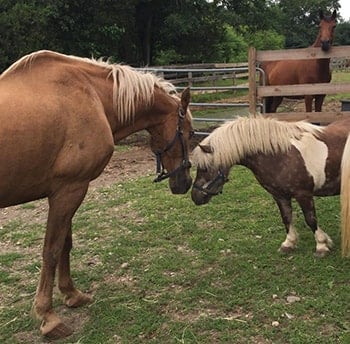 Fly Repellents
Fly Repellents